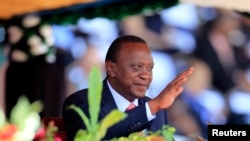The International Criminal Court has rejected a bid by Kenyan President Uhuru Kenyatta to stop his upcoming trial on charges of crimes against humanity.
Kenyatta's lawyers had urged The Hague-based court to stop proceedings, saying the prosecution had presented misleading information to the court.
But in a statement Thursday, the ICC said the accusations from Kenyatta's team were not serious enough to stop the trial, which is set to begin February 5.
The court also said the president's lawyers could challenge any misleading information from prosecutors during the trial.
President Kenyatta and his deputy William Ruto are accused of orchestrating ethnic violence after Kenya's 2007 presidential election. More than 1,100 people were killed. Ruto's trial is underway.
In November, the ICC reversed a ruling that required Kenyatta to attend only parts of his trial.
The court said "as a general rule," Kenyatta must be present but that requests for him to miss portions would be considered on a "case-by-case basis."
Kenyan officials had argued that neither Kenyatta nor Ruto could spend long periods time in The Hague while the country fights the threat of regional terrorism.
In September, more than 60 civilians were killed when al-Shabab militants attacked a Nairobi mall.
Some information for this report was provided by AP and Reuters.
Kenyatta's lawyers had urged The Hague-based court to stop proceedings, saying the prosecution had presented misleading information to the court.
But in a statement Thursday, the ICC said the accusations from Kenyatta's team were not serious enough to stop the trial, which is set to begin February 5.
The court also said the president's lawyers could challenge any misleading information from prosecutors during the trial.
President Kenyatta and his deputy William Ruto are accused of orchestrating ethnic violence after Kenya's 2007 presidential election. More than 1,100 people were killed. Ruto's trial is underway.
In November, the ICC reversed a ruling that required Kenyatta to attend only parts of his trial.
The court said "as a general rule," Kenyatta must be present but that requests for him to miss portions would be considered on a "case-by-case basis."
Kenyan officials had argued that neither Kenyatta nor Ruto could spend long periods time in The Hague while the country fights the threat of regional terrorism.
In September, more than 60 civilians were killed when al-Shabab militants attacked a Nairobi mall.
Some information for this report was provided by AP and Reuters.





